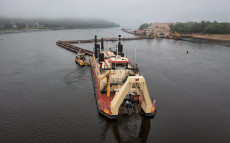- pathfindersAI
- Job Profile
Derrick Operators, Oil and Gas
Summary
Derrick Operators in Oil and Gas: A Career Overview
What They Do
Derrick Operators play a pivotal role in the oil and gas industry, executing key tasks essential for the extraction of these vital resources. They are primarily responsible for setting up and operating derricks—specialized rigs used in drilling operations. The role involves managing the hoisting equipment, ensuring proper rigging, and overseeing the machinery that lifts drilling apparatus into and out of the ground. Derrick Operators are the backbone of any successful drilling operation, as their expertise ensures efficiency and safety during the drilling process.
Job Responsibilities
The responsibilities of a Derrick Operator are manifold, requiring a blend of technical acumen and physical endurance. They oversee the assembly and disassembly of drilling rigs and ensure that all equipment is correctly positioned and secured. This involves managing the various components of the derrick, such as valves, pumps, and swivel systems. Derrick Operators also monitor the drill and mud systems, ensuring the smooth circulation of drilling fluids. Safety is paramount, and they must rigorously adhere to safety protocols, regularly inspect equipment, and perform necessary maintenance.
Communication is another critical facet of the role. Derrick Operators must coordinate closely with other crew members, including drillers and rig managers, to ensure smooth and efficient operations. They also contribute to the planning and preparation stages, assisting with measurements and the interpretation of drilling data.
Essential Skills
To thrive as a Derrick Operator, one must possess a blend of technical, physical, and interpersonal skills. A strong understanding of mechanical systems and hydraulic machinery is essential, as is the ability to troubleshoot and repair these systems swiftly. Physical stamina and dexterity are also crucial, given the demanding nature of the job, which often involves climbing tall structures and working in challenging environments.
Attention to detail and a commitment to safety are indispensable. Operators must be able to identify potential hazards and implement preventative measures. Effective communication skills are necessary for seamless coordination with the team, and problem-solving abilities are vital for addressing unexpected issues that arise during drilling operations. Additionally, a good understanding of basic mathematics and physics can be beneficial in performing the technical aspects of the job.
Educational Pathways
While some Derrick Operators enter the field through on-the-job training and experience, having a formal educational background can enhance job prospects and career advancement opportunities. Many employers prefer candidates who have completed a high school diploma or equivalent, though post-secondary education in relevant fields can be advantageous.
Relevant educational pathways include vocational training programs, associate degrees, and certifications in petroleum technology, mechanical engineering, or related fields. Technical schools and community colleges often offer specialized courses in oil and gas operations, rigging, and safety procedures. Completing these programs provides foundational knowledge and hands-on experience, making candidates more competitive in the job market.
Career Prospects
The demand for Derrick Operators is closely tied to the broader energy sector, which can be influenced by economic conditions and advances in extraction technology. Despite these variables, the long-term outlook remains promising, driven by ongoing global energy needs and the development of new drilling projects. Experienced operators with a strong safety record and advanced technical skills typically have excellent job stability and opportunities for advancement.
Many Derrick Operators progress to positions such as Drillers or Rig Managers, roles that come with greater responsibilities and higher remuneration. Additional certifications and ongoing professional development can further enhance career prospects, enabling operators to stay current with industry trends and technological advancements.
Conclusion
In conclusion, a career as a Derrick Operator in the oil and gas industry offers a unique blend of challenges and rewards. This role is essential for effective and safe drilling operations, requiring a comprehensive skill set and a strong commitment to safety. Educational pathways, ranging from vocational training to associate degrees, provide valuable preparation for this demanding but fulfilling career. With promising job prospects and opportunities for advancement, becoming a Derrick Operator can be a highly rewarding career choice for those with the requisite skills and dedication.
Video
Compensation
| State | Median Salary | Median Hourly | Positions |
|---|---|---|---|
| AK | 78,600 | 37.79 | 220 |
| CA | 58,400 | 28.08 | 490 |
| CO | 51,320 | 24.67 | 330 |
| IL | 27,040 | 13.00 | 40 |
| KS | 40,440 | 19.44 | 140 |
| LA | 60,470 | 29.07 | 460 |
| MI | 39,490 | 18.99 | 90 |
| MS | 47,830 | 22.99 | 100 |
| NM | 60,330 | 29.01 | 1,070 |
| ND | 64,550 | 31.03 | 730 |
| OK | 54,690 | 26.29 | 910 |
| TX | 54,080 | 26.00 | 6,390 |
| WV | 55,740 | 26.80 | 130 |
| WY | 58,200 | 27.98 | 210 |
Similar Occupations
In this area you will find other occupations that are close to the one you were viewing in tasks, knowledge and work environment. If the primary job profile you are viewing isn't quite to your liking, take a look around and see what else is available.
Basic and Premium Accounts have more alternative occupations available than the Free account.

Dredge Operators - 53-7031.00
A Dredge Operator is responsible for operating dredging equipment to excavate and remove underwater materials like sand, gravel, and silt from bodies of water such as rivers, lakes, and harbors. Their work ensures navigational channels are clear and often contributes to environmental management and land reclamation projects.
-
$50,440/yr
Median Pay -
940
Number of Jobs

Earth Drillers, Except Oil and Gas - 47-5023.00
Earth Drillers, Except Oil and Gas, operate various drilling equipment to tap into soil, rock, and underground water sources for purposes such as construction, environmental testing, and mineral exploration. Their duties include monitoring equipment performance, maintaining safety standards, and ensuring the accuracy of drill depths and angles.
-
$56,660/yr
Median Pay -
18,010
Number of Jobs